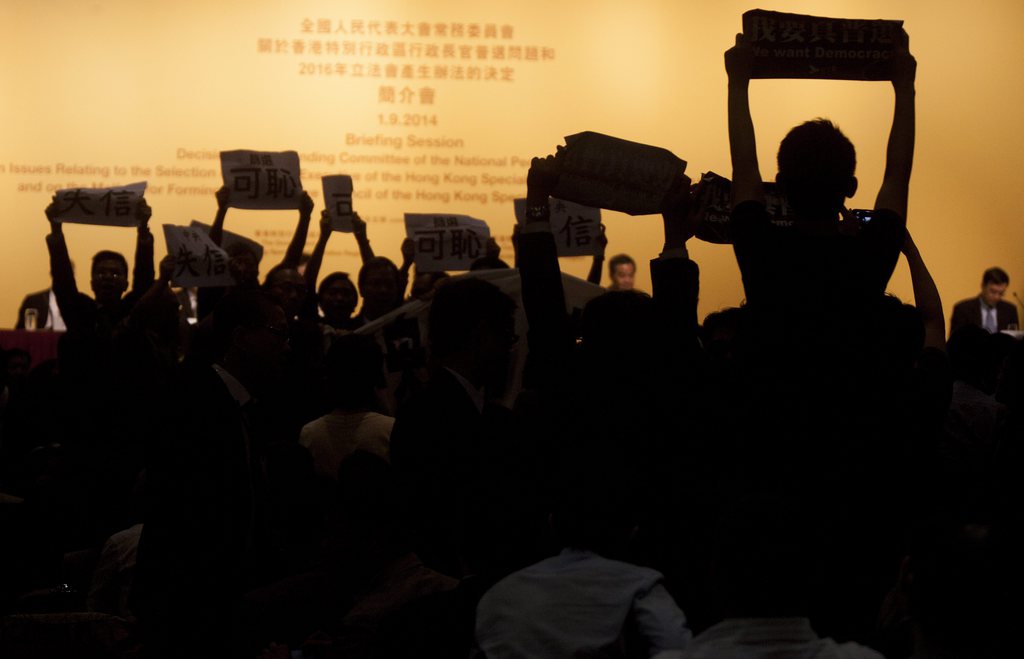Hong Kong’s special status is stretched to its limit
October 1 is National Day in China, a moment to remember the glorious foundation in 1949 of the People’s Republic by a Communist party that continues to rule 65 years later. The people of Hong Kong, however, did not receive the telegram.
Instead, hundreds of thousands will pour out on to the streets to protest against a system that denies them the right to vote. Symbolically, the fireworks that normally light up Hong Kong harbour on October 1 have been cancelled.
The student-led protests that have engulfed the city have brought into sharp, potentially dangerous, relief the contradictions at the heart of the one country, two systems formula. A plan cooked up by Chinese and British diplomats to preserve Hong Kong’s freedoms while returning it to Beijing’s control, the model is stretched to its limits.
Since handover in 1997, Beijing has been prepared to tolerate Hong Kong’s independent institutions, a legacy of the British (who somehow forgot to implement democracy while they were at it). Beijing has done so even when the exercise of freedoms by the city’s inhabitants has hurt its prestige. Thus Hong Kong’s newspapers have been free to criticise the communist system, and Hong Kong’s citizens to commemorate the victims of the Tiananmen Square massacre in 1989. Hong Kong, a city of 7m, has been small enough and – for many Chinese trapped behind the Great Firewall – distant enough for Beijing to allow such largesse. But there are limits. Those limits have now been reached.

More
Financial Times
External linkMost Hongkongers want a genuine form of democracy that will allow them to choose their own leaders, though by no means all are willing to face tear gas to obtain it. They want it not only for abstract reasons of being treated like citizens. They want it for practical reasons too: to vote in a government more attuned to their concerns. Many are dissatisfied with the current state of affairs in which house prices are too high, social mobility too low and welfare provision inadequate. They see this, rightly, as the result of collusion between Hong Kong’s tycoons and Beijing’s Communists, who both see cheap doormen and a safe place to park their money as more important than social justice. The idea of letting people vote scares those who run Hong Kong almost as much as it does those running China.
In fairness, Beijing has stuck closely to the terms of the handover and to the stipulations of the Basic Law, Hong Kong’s mini-constitution. Even the deal it has offered on universal suffrage fulfils its promises, allowing 5m eligible voters to choose between pre-screened candidates. The problem is, the people of Hong Kong, who had no hand in making the deal, now want more.
What happens next is very unpredictable. The Hong Kong administration led by CY Leung tried to quash protests on Sunday night using riot police. Having failed to do so, he has withdrawn his forces to consider his options. Mr Leung will be hoping against hope that the protests simply peter out and that practical Hongkongers will tire of the inconvenience and damage to the economy. His security forces could then mop up the small number of stragglers. Just as likely, though, fairly large numbers of protesters will hold on for days, obliging Mr Leung to contemplate even tougher measures to disperse them. Too much violence – or too little success – and Beijing may call time on his tenure.
Xi Jinping, China’s president, thousands of miles away in Beijing, is under no less pressure. Hong Kong may not be the capital. Its special status may allow a little more leeway. Nevertheless, a Chinese city is in open revolt. Mr Xi is already being tested in Xinjiang in the far west, scene of several gruesome terrorist attacks. Then there is Taiwan, a democratic, self-ruled island that Beijing says is an inalienable part of China. Unaccountably, Mr Xi has chosen precisely this moment to press the case for Taiwan’s return to the bosom of China, saying the one country, two systems model would be good for Taiwan. The Taiwanese are looking at events in Hong Kong and shaking their heads in disbelief. Even Ma Ying-jeou, Taiwan’s Kuomintang leader, was obliged to declare Mr Xi’s words unacceptable.
What of Hong Kong? There are three plausible outcomes. First, protesters win small concessions on democracy. Second, more likely, Mr Leung does not budge and Hong Kong returns to an uneasy status quo ante in which the limits of the formula are glaringly apparent. Third is that Beijing calls a halt to the whole one country, two systems proceedings. The chances of that are remote. Hong Kong’s openness – financial as well as political – is what makes it important to China. But unlike Russia in Ukraine, China would not need an invasion force. The People’s Liberation Army has been stationed in the city since 1997. And Hong Kong has been an integral part of China for 17 years.
Copyright The Financial Times Limited 2014

In compliance with the JTI standards
More: SWI swissinfo.ch certified by the Journalism Trust Initiative










You can find an overview of ongoing debates with our journalists here . Please join us!
If you want to start a conversation about a topic raised in this article or want to report factual errors, email us at english@swissinfo.ch.